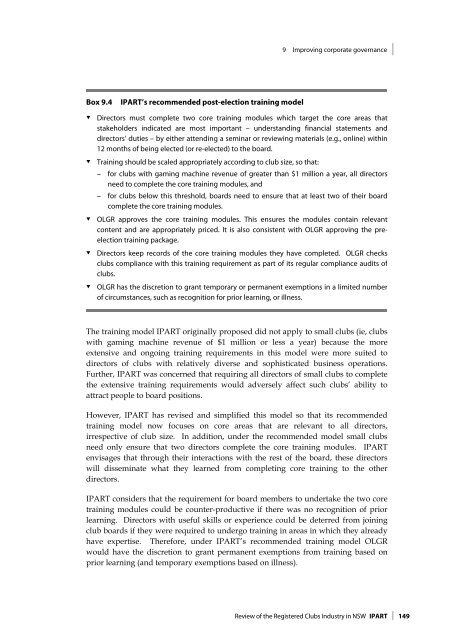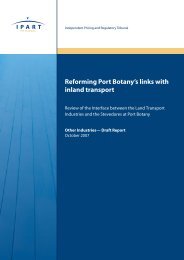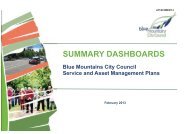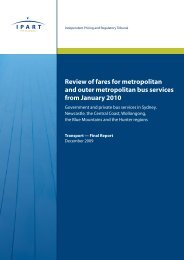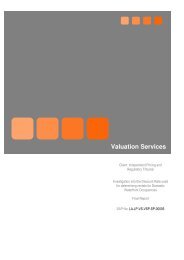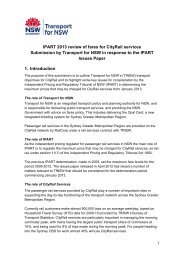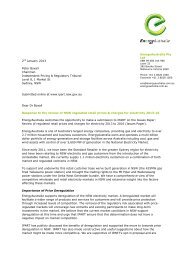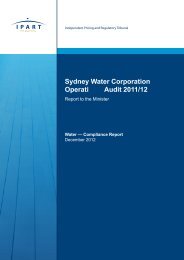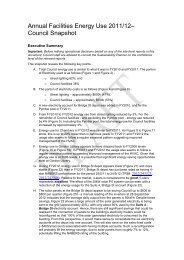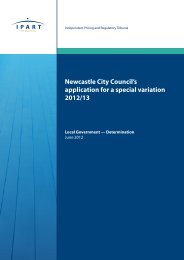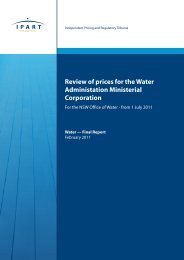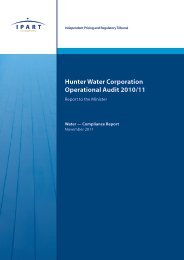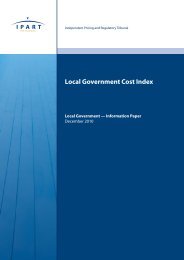Review of the Registered Clubs Industry in NSW - Clubs NSW
Review of the Registered Clubs Industry in NSW - Clubs NSW
Review of the Registered Clubs Industry in NSW - Clubs NSW
Create successful ePaper yourself
Turn your PDF publications into a flip-book with our unique Google optimized e-Paper software.
9 Improv<strong>in</strong>g corporate governance<br />
Box 9.4<br />
IPART’s recommended post-election tra<strong>in</strong><strong>in</strong>g model<br />
<br />
<br />
<br />
<br />
<br />
Directors must complete two core tra<strong>in</strong><strong>in</strong>g modules which target <strong>the</strong> core areas that<br />
stakeholders <strong>in</strong>dicated are most important – understand<strong>in</strong>g f<strong>in</strong>ancial statements and<br />
directors’ duties – by ei<strong>the</strong>r attend<strong>in</strong>g a sem<strong>in</strong>ar or review<strong>in</strong>g materials (e.g., onl<strong>in</strong>e) with<strong>in</strong><br />
12 months <strong>of</strong> be<strong>in</strong>g elected (or re-elected) to <strong>the</strong> board.<br />
Tra<strong>in</strong><strong>in</strong>g should be scaled appropriately accord<strong>in</strong>g to club size, so that:<br />
– for clubs with gam<strong>in</strong>g mach<strong>in</strong>e revenue <strong>of</strong> greater than $1 million a year, all directors<br />
need to complete <strong>the</strong> core tra<strong>in</strong><strong>in</strong>g modules, and<br />
– for clubs below this threshold, boards need to ensure that at least two <strong>of</strong> <strong>the</strong>ir board<br />
complete <strong>the</strong> core tra<strong>in</strong><strong>in</strong>g modules.<br />
OLGR approves <strong>the</strong> core tra<strong>in</strong><strong>in</strong>g modules. This ensures <strong>the</strong> modules conta<strong>in</strong> relevant<br />
content and are appropriately priced. It is also consistent with OLGR approv<strong>in</strong>g <strong>the</strong> preelection<br />
tra<strong>in</strong><strong>in</strong>g package.<br />
Directors keep records <strong>of</strong> <strong>the</strong> core tra<strong>in</strong><strong>in</strong>g modules <strong>the</strong>y have completed. OLGR checks<br />
clubs compliance with this tra<strong>in</strong><strong>in</strong>g requirement as part <strong>of</strong> its regular compliance audits <strong>of</strong><br />
clubs.<br />
OLGR has <strong>the</strong> discretion to grant temporary or permanent exemptions <strong>in</strong> a limited number<br />
<strong>of</strong> circumstances, such as recognition for prior learn<strong>in</strong>g, or illness.<br />
The tra<strong>in</strong><strong>in</strong>g model IPART orig<strong>in</strong>ally proposed did not apply to small clubs (ie, clubs<br />
with gam<strong>in</strong>g mach<strong>in</strong>e revenue <strong>of</strong> $1 million or less a year) because <strong>the</strong> more<br />
extensive and ongo<strong>in</strong>g tra<strong>in</strong><strong>in</strong>g requirements <strong>in</strong> this model were more suited to<br />
directors <strong>of</strong> clubs with relatively diverse and sophisticated bus<strong>in</strong>ess operations.<br />
Fur<strong>the</strong>r, IPART was concerned that requir<strong>in</strong>g all directors <strong>of</strong> small clubs to complete<br />
<strong>the</strong> extensive tra<strong>in</strong><strong>in</strong>g requirements would adversely affect such clubs’ ability to<br />
attract people to board positions.<br />
However, IPART has revised and simplified this model so that its recommended<br />
tra<strong>in</strong><strong>in</strong>g model now focuses on core areas that are relevant to all directors,<br />
irrespective <strong>of</strong> club size. In addition, under <strong>the</strong> recommended model small clubs<br />
need only ensure that two directors complete <strong>the</strong> core tra<strong>in</strong><strong>in</strong>g modules. IPART<br />
envisages that through <strong>the</strong>ir <strong>in</strong>teractions with <strong>the</strong> rest <strong>of</strong> <strong>the</strong> board, <strong>the</strong>se directors<br />
will dissem<strong>in</strong>ate what <strong>the</strong>y learned from complet<strong>in</strong>g core tra<strong>in</strong><strong>in</strong>g to <strong>the</strong> o<strong>the</strong>r<br />
directors.<br />
IPART considers that <strong>the</strong> requirement for board members to undertake <strong>the</strong> two core<br />
tra<strong>in</strong><strong>in</strong>g modules could be counter-productive if <strong>the</strong>re was no recognition <strong>of</strong> prior<br />
learn<strong>in</strong>g. Directors with useful skills or experience could be deterred from jo<strong>in</strong><strong>in</strong>g<br />
club boards if <strong>the</strong>y were required to undergo tra<strong>in</strong><strong>in</strong>g <strong>in</strong> areas <strong>in</strong> which <strong>the</strong>y already<br />
have expertise. Therefore, under IPART’s recommended tra<strong>in</strong><strong>in</strong>g model OLGR<br />
would have <strong>the</strong> discretion to grant permanent exemptions from tra<strong>in</strong><strong>in</strong>g based on<br />
prior learn<strong>in</strong>g (and temporary exemptions based on illness).<br />
<strong>Review</strong> <strong>of</strong> <strong>the</strong> <strong>Registered</strong> <strong>Clubs</strong> <strong>Industry</strong> <strong>in</strong> <strong>NSW</strong> IPART 149


